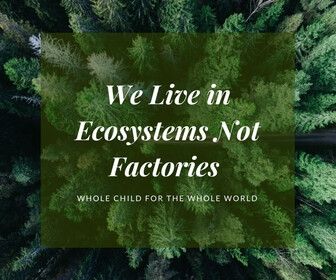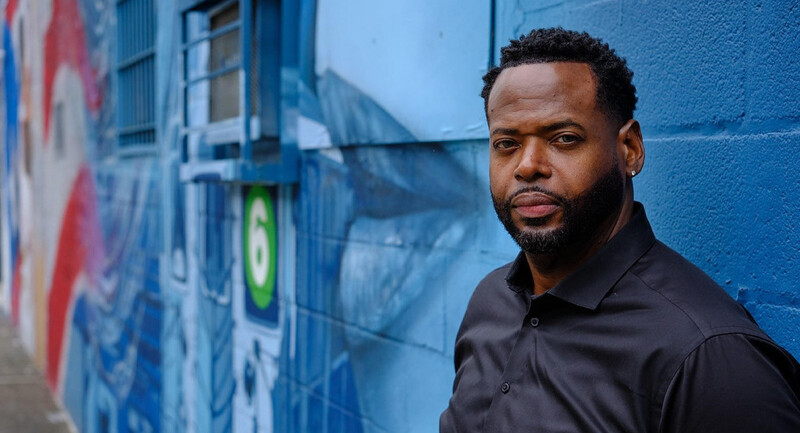We live in ecosystems not factories. We must educate in ecosystems not assembly lines.
We’ve been saying this or words similar to this for a while now but the reality of our world, our globe, is that what occurs in one country affects others. What occurs in one part of a city affects the other suburbs. And what occurs in a community affects what occurs in a school.
We live in an ecosystemic world and we must reimagine our education systems to be more ecosystemic. We must take an ecosystemic approach both because it benefits learning and because it ensures our children grow understanding their influence in, and responsibility for, our world.
ecosystem
noun,
a system, or a group of interconnected elements, formed by the interaction of a community of organisms with their environment.
systemic
adjective,
relating to a system, especially as opposed to a particular part.
But what does the word ecosystemic mean for schools, education, and for learning?
It means, that we must appreciate that our communities, its ups and downs, wins and losses, gains and struggles, affect our schools. Schools must be resilient and adaptable enough to adjust to the constantly changing environment they exist in. It is not enough for schools to ignore what occurs in a community and assume that they can or should act as if they were a separate entity. Hungry kids need nutrition; homeless kids need shelter; fearful kids need support.
But an ecosystem goes both ways. Communities must also understand the role they play in assisting, supporting and boosting the learning process. Communities must view themselves as part of the network which helps educate children and youth. They must take part ownership of child and youth development, extending learning across and outside the school boundaries geographical boundaries, and outside the 9-3 or in many cases the 7:30-2:30 schoolday.
It means, that learning must be re-understood to not be a conveyor belt process in which student knowledge is given to cohorts of students but rather than learning is a process of interactions and relationships that build knowledge, context and meaning. We have decried the assembly line method of education – the 19th and early 20th century model of adding pieces at the same time, in the same manner – for at least a decade now, but we still persist with over emphasizing benchmarks, time points, their meaning and worth. We still have systems that demand that children learn the same content, at the same time, at the same pace. For too many of our schools it’s still a case of “if it is 11:15 on Monday then we must be on page 43 learning Algebra”.
Benchmarks are a framework to aid in the development and learning of our students but too often become the finite focus of all we do in a classroom. It is a ‘fools gold’ to believe that the benchmark of reading by 3rd grade and the likely later in life outcomes will be solved merely by doubling down on reading in 2nd grade. A 3rd grade reading score is a flashlight to a range of issues that need to be addressed. The score is merely an indicator of a wider set of issues that need to be addressed. Treating a broken leg with painkillers alleviates the most apparent issue temporarily but does nothing the mend the issue.
It means, that learning takes place, and is taking place more often, across more platforms – classrooms, community-based, online – than ever before and across all hours of the day. Flipped classrooms, project-based learning and alike have begun this transformation but we need to push it more. Learning takes place 24/7 and does not stop once we graduate. Schools can be the hub where mentors, experts and teachers reside, but they cannot be thought of as the only place where learning occurs. Many jurisdictions are taking the next step as highlighted in a recent Global Change Leaders Summit in Lyon, France. Municipalities in both Lyon and Manchester in the UK are looking at expanding their learning ecosystem to incorporate the local ecosystem – its buildings, history, culture, and services. What is beginning to play out are a hybrid of scenarios from the 2001 Future of Schooling report (OECD) which described several scenarios in which networks expand outside the school building, and schools potentially become hubs of learning where teachers guide learning which then takes place both inside, outside and across the community. In this sense schools become core social centers, and centers for a network of learning. Whether this plays out to be – as cited in the report – re-schooling in which schools eventually are viewed as centers of a community and its social capital formation, or de-schooling in which learning is constructed via learner networks and the network society, time will tell.
It means, that we must accept that learning, understanding and the accrual of knowledge comes about via interactions and relationships. Relationships that are formed with individuals – our peers, mentors, teachers, adults but not only with individuals. Interactions with our and other communities, cultures and opinions. Learning, and the formation of meaning and knowledge, is developed via interactions, and is a process. As such teaching must become more fluid and artful. It should be a concern to educators to still view classrooms with desks in rows as we aim to teach and develop collaboration skills. It should concern us that student agency is too often restricted to a binary choice of two subject matter options.
It is an understanding, as Dr. James Comer, professor of Child Psychiatry, Yale University, stated “No significant learning occurs without a significant relationship”. This is nothing new to those in education has been highlighted by Douglas Fisher and Nancy Frey (2013), Eric Jensen (2005) and back to Howard Gardner in 1983.
It also means, that we must all understand that we live inside an ecosystem ourselves and appreciate that the actions we take have influence for others in our communities, regions and world at large. It is no longer satisfactory to believe that there are no repercussions – nor benefits – from our actions on others. By teaching in an ecosystemic way we also begin to teach our children that they are part of this world and therefore have a responsibility towards it.
We envisage a world in which all young people grow up with educational experiences that empower them to realize their full potential (whole child) as active contributors to our collective wellbeing (whole world). Together we can change much – we can help each child reach their full potential, becoming global citizens who see themselves as guardians of the world they live in.
Sean Slade is the Senior Director of Global Outreach at ASCD, a global mission-driven education association. During his more than two decades in education, spanning 5 countries and four continents, he has spoken and written extensively on topics related to the whole child and health and well-being, and he has been at the forefront of promoting and using school climate, connectedness, resilience, and a youth development focus for school improvement.
.
Sean Slade is an education leader, speaker, and author, with nearly three decades of experience in education in the U.S. and globally. He serves as Head of BTS Spark, North America, the social impact arm of BTS focusing on educational leadership development. Prior to BTS Spark, Sean was senior director of global outreach at ASCD, where he launched and grew the ASCD Whole Child Network across 56 countries and led the development of the Whole School, Whole Community, Whole Child Model (WSCC) with the CDC. His latest book is The Power of the Whole: What is Lost by Focusing on Individual Things.








